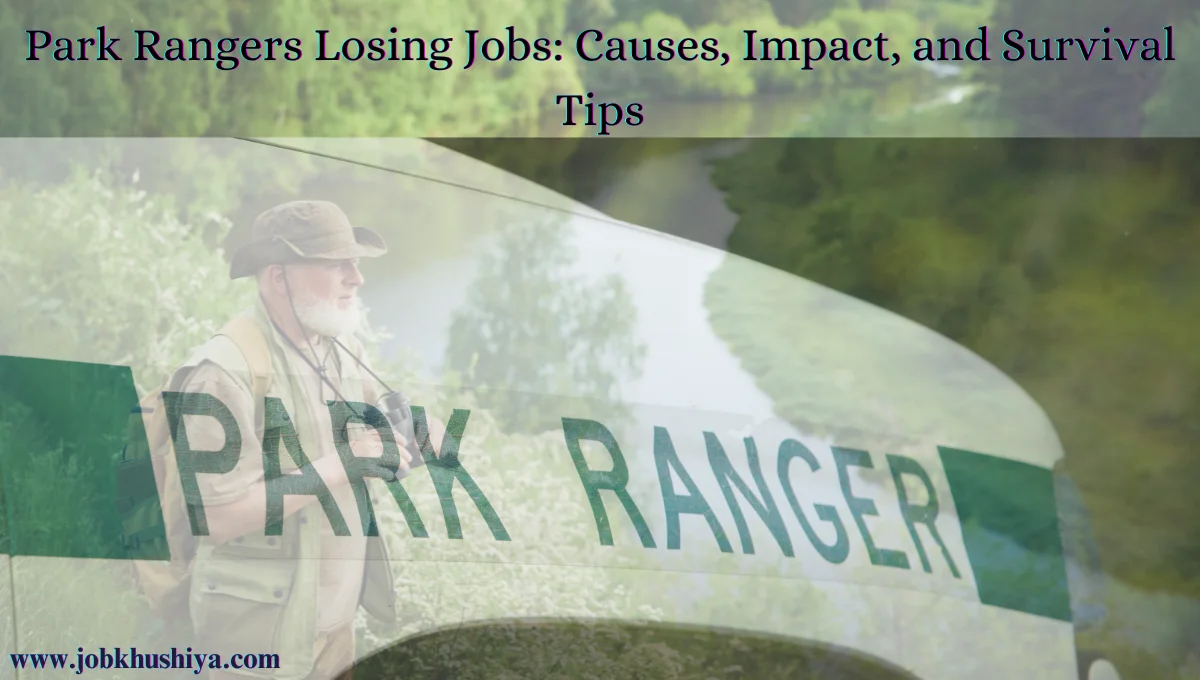Introduction:
Park rangers play a crucial role in protecting natural resources, wildlife, and public lands. They ensure the safety of visitors, educate the public, and enforce conservation laws. However, in recent years, many park rangers have faced job losses due to budget cuts, environmental policy shifts, and changes in tourism patterns. This article explores the reasons behind these job losses, their impact, and provides guidance and tips for park rangers navigating this difficult situation.
Park Rangers Losing Jobs: Causes, Impact, and Survival Tips:
Reasons for Park Rangers Losing Jobs
1. Budget Cuts and Funding Issues
Government agencies often allocate limited funds for park services. When budget cuts occur, park ranger positions are among the first to be reduced. The lack of funding affects salaries, maintenance of park facilities, and overall operations.
2. Automation and Technological Advancements
With the rise of technology, many traditional roles of park rangers are being automated. Drones are now used for surveillance, AI-powered kiosks provide visitor information, and automated security systems reduce the need for human patrols.
3. Declining Tourism and Revenue Loss
Tourism is a major funding source for national and state parks. Events such as the COVID-19 pandemic, economic downturns, and natural disasters have significantly impacted tourism, leading to lower revenues and job cuts for park rangers.
4. Privatization of Parks
In some cases, governments have outsourced park management to private organizations. These organizations may operate with a focus on profitability rather than conservation, leading to fewer employment opportunities for rangers.
5. Environmental and Climate Challenges
Natural disasters like wildfires, floods, and extreme weather conditions have made park operations more challenging. In some cases, parks have been permanently closed or temporarily shut down, leading to layoffs of park rangers.
6. Policy Changes and Government Priorities
Changes in government policies can affect funding and staffing. When conservation efforts are deprioritized in favor of other sectors, park ranger jobs are often among the casualties.
Impact of Job Losses on Park Rangers
1. Financial Struggles
Losing a job can lead to financial difficulties, especially for those who have dedicated years to public service and may not have alternative income sources.
2. Emotional and Mental Health Issues
Job loss can cause stress, anxiety, and a sense of loss. Many park rangers are deeply passionate about their work, and losing their job can feel like losing their purpose.
3. Loss of Expertise in Conservation
Experienced park rangers possess invaluable knowledge about wildlife, ecosystems, and conservation practices. Their departure weakens efforts to protect natural resources.
4. Impact on Public Safety and Environmental Protection
Fewer park rangers mean fewer personnel to enforce laws, assist visitors, and manage emergencies. This can lead to increased poaching, illegal activities, and degradation of park resources.
Guide and Tips for Park Rangers Facing Job Loss
1. Exploring Alternative Career Paths
If you’re a park ranger facing job loss, consider the following alternative careers:
- Environmental Conservationist: Work with NGOs and government agencies on conservation projects.
- Wildlife Rehabilitation Specialist: Help injured or endangered wildlife.
- Outdoor Educator: Teach environmental awareness in schools and organizations.
- Ecotourism Guide: Use your knowledge to guide tours in nature reserves and adventure camps.
- Forestry and Fire Management Roles: Join firefighting and forestry services to manage natural disasters.
- Law Enforcement or Security Roles: Utilize your enforcement skills in security agencies.
2. Upskilling and Gaining New Certifications
Enhancing your skills can open doors to new job opportunities. Consider gaining certifications in:
- GIS and Remote Sensing (for environmental monitoring)
- First Aid and Emergency Response Training
- Environmental Law Enforcement
- Drone Operation and Surveillance
- Wildlife Biology and Management
3. Leveraging Networking and Professional Organizations
Connecting with others in your field can help you find job leads and support. Consider joining:
- The National Park Service Alumni Network
- Conservation organizations such as the Sierra Club or WWF
- Online communities for environmental professionals on LinkedIn
4. Seeking Temporary or Part-Time Work in Related Fields
While searching for a full-time role, consider part-time or seasonal positions such as:
- Trail maintenance jobs
- Park tour guide roles
- Environmental consulting work
- Writing or blogging about conservation
5. Financial Planning and Support
If you’ve lost your job, take proactive steps to manage your finances:
- Apply for unemployment benefits (if eligible)
- Reduce unnecessary expenses and create a budget
- Look for grant opportunities and financial aid for career transition
6. Staying Involved in Conservation Efforts
Even if you’re not employed as a ranger, you can still contribute:
- Volunteer for conservation projects
- Advocate for policies that support parks and wildlife
- Participate in community clean-up and reforestation efforts
Conclusion:
The loss of park ranger jobs is a challenging reality due to financial constraints, policy shifts, and environmental changes. However, by staying adaptable, learning new skills, and exploring alternative career paths, affected rangers can continue to contribute to environmental conservation. The passion and dedication of park rangers remain invaluable, and their expertise can be utilized in various ways beyond traditional park service roles. By taking proactive steps, former park rangers can navigate career transitions successfully while staying true to their mission of protecting nature.
